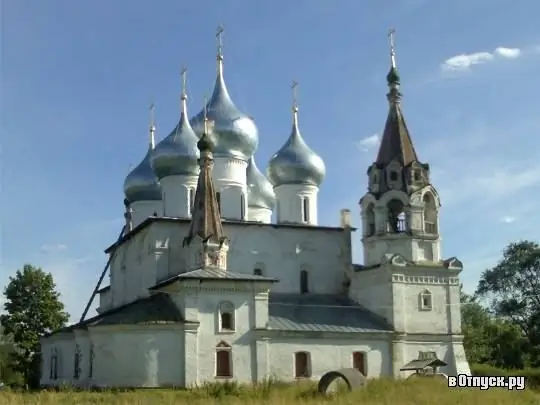
Description of the attraction
The Cathedral of the Exaltation of the Cross was built in 1658. It stands on a large square, which is completely surrounded by earthen oxen or the remains of the ancient Romanov Kremlin. The external decoration of the cathedral is not particularly remarkable, but nevertheless it is beautiful and is a single whole with a hipped-roof bell tower and domes.
According to an old legend, the Romanov temple was founded with the support of Prince Roman from the city of Uglich in 1283. The cathedral that exists today was built for about 40 years with the money of parishioners and virtues; its consecration took place in 1658. The cathedral was built at a slow pace, because there was a catastrophic lack of money; it is known that Tsar Alexei Mikhailovich sent 100 rubles to the residents of the city on a petition. This amount was very large in those days, because even a cow - the breadwinner of any family - could be bought for 1.5 rubles; equipping an equestrian warrior cost about 7 rubles, and buying an overseas caftan made of good fabrics (taffeta, velvet, brocade) - for 11 rubles.
Initially, the temple was single-domed and ended with a helmet-shaped top, with one altar in honor of the Exaltation of the Life-giving and Honest Cross of the Lord. Around the middle of the 17th century, the cathedral was rebuilt, a bell tower, chapels and new chapters were added.
The Cathedral of the Exaltation of the Cross impresses with its powerful quadrangle of the main room, massive high drums, and impressive domes. The cathedral is four-pillar, cross-domed, equipped with five apses and crowned with a powerful five-domed cathedral. On the side of the southern altar semicircle there is a chapel consecrated in honor of the Smolensk Icon of the Mother of God, and in the northern semicircle there is a warm chapel dedicated to the Entry into the Church of the Most Holy Theotokos. The completion of both side-altars is made in the form of slender and low stone tents, which, according to tradition, were framed at the base of the kokoshniks. The consecration of the temple is carried out through the window openings made in all the drums - this has its own meaning - the light of Christ illuminates everyone, while the absence of window openings from below carried the task of focusing the attention of the pilgrims only on prayer.
The Cathedral of the Exaltation of the Cross is completely surrounded by a gallery rebuilt in the 19th century. The hipped bell tower is made especially strong, which is precisely matched to the cathedral; it has one tier of rumors, and also adjoins it from the northwest. There is evidence that it once had eight bells.
The murals of the cathedral are amazing, they were made by the Kostroma masters Gury Nikitin and Vasily Ilyin, but to this day it has not survived. The images of the saints of the Russian and Greek churches are on powerful high-rise pillars. Among them are famous names such as Roman Uglichsky, Mikhail Tverskoy, Konstantin Yaroslavsky, princesses Lyudmila and Olga and some others. The murals on the gallery show the Old Testament story of the Beautiful Joseph, as well as numerous other subjects and even a painting of the Last Judgment. On the south wall of the cathedral the tree of Jesse and the Passion of Christ is depicted, and on the north wall the story of the acquisition of the Cross and the conversion of Saul is painted; from the west the Apocalypse is presented.
Until the closure of the cathedral, it contained a huge number of ancient icons, among which the Tikhvin icon of the Mother of God, the icon of the Svensk Mother of God, were especially appreciated, because in front of their images they prayed for help to cure people from drunkenness. Unfortunately, only the frame of the iconostasis dating from the 17th century has survived to this day.
At the end of 1992, the Cathedral of the Exaltation of the Cross was returned to the Russian Orthodox Church, but restoration work began only in the 2000s, when the abbots and parishioners decided to transform it. The main problem was the depressing state of the frescoes, most of which were lost.
Today, services are regularly held in the cathedral. At the expense of the city administration, light illumination was made, transforming the cathedral at night.






